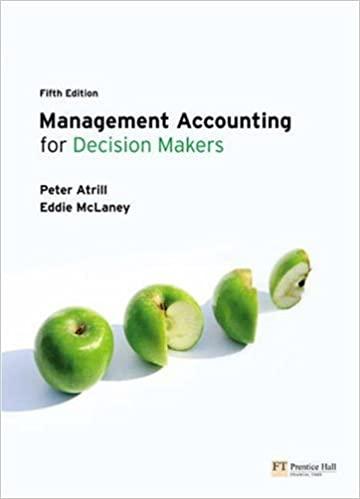Brown and Jeffreys, a West Midlands business, makes one standard product for use in the motor trade.
Question:
Brown and Jeffreys, a West Midlands business, makes one standard product for use in the motor trade. The product, known as the Fuel Miser, for which the business holds the patent, when fitted to the fuel system of production model cars has the effect of reducing petrol consumption. Part of the production is sold direct to a local car manufacturer, which fits the Fuel Miser as an optional extra to several of its models and the rest of the production is sold through various retail outlets, garages, and so on. Brown and Jeffreys assemble the Fuel Miser, but all three components are manufactured by local engineering businesses. The three components are codenamed A, B and C. One Fuel Miser consists of one of each component. The planned sales for the first seven months of the forthcoming accounting period, by channels of distribution and in terms of Fuel Miser units, are as follows: Jan Feb Mar Apr May June July Manufacturers 4,000 4,000 4,500 4,500 4,500 4,500 4,500 Retail, and so on 2,000 2,700 3,200 3,000 2,700 2,500 2,400 6.000 6,700 7,700 7,500 7.200 7.000 6.900 The following further information is available: (1) There will be inventories of finished units at 1 January of 7,000 Fuel Misers. (II) The inventories of raw materials at 1 January will be: A 10,000 units B 16,500 units C 7,200 units (iii) The selling price of Fuel Misers is to be 10 each to the motor manufacturer and 12 each to retail outlets. (iv) The maximum production capacity of the business is 7,000 units a month. There is no possibility of increasing this output.
(v) Assembly of each Fuel Miser will take 10 minutes of direct labour. Direct labour is paid at the rate of £7.20 an hour during the month of production.
(vi) The components are each expected to cost the following:
A £2.50 B £1.30 C £0.80 (vii) Indirect costs are to be paid at a regular rate of £32,000 each month.
(viii) The cash at the bank at 1 January will be £2,620.
The planned sales volumes must be met and the business intends to pursue the following policies for as many months as possible, consistent with meeting the sales targets:
l Finished inventories at the end of each month are to equal the following months total sales to retail outlets, and half the total of the following month’s sales to the motor manufacturer.
l Raw materials at the end of each month are to be sufficient to cover production requirements for the following month. The production for July will be 6,800 units.
l Suppliers of raw materials are to be paid during the month following purchase. The payment for January will be £21,250.
l Customers will pay in the month of sale, in the case of sales to the motor manufacturer, and the month after sale, in the case of retail sales. Retail sales during December were 2,000 units at £12 each.
6.8 EXERCISES 207 Required:
Prepare the following budgets in monthly columnar form, both in terms of money and units (where relevant), for the six months of January to June inclusive:
(a) Sales budget.*
(b) Finished inventories budget (valued at direct cost).†
(c) Raw materials inventories budget (one budget for each component).†
(d) Production budget (direct costs only).*
(e) Trade receivables budget.†
(f ) Trade payables budget.†
(g) Cash budget.AppendixLO1
Step by Step Answer:

Management Accounting For Decision Makers
ISBN: 9780273710448
5th Edition
Authors: Peter Atrill, E. J McLaney





